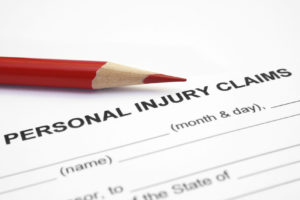Negligence

The word “negligence” is a legal term of art that means something like “carelessness,” but with more nuance. If someone injures you through any form of misconduct, you can normally pursue a personal injury claim for money damages against them. To win most personal injury claims, you must prove that the defendant acted with a culpable mental state, such as negligence.
Examples of Culpable Mental States
Culpable mental states that can justify imposing liability on a defendant include:
- Negligence (running a stop light, for example);
- Gross negligence (DUI; for example); and
- Intentional misconduct. (a “road rage” incident where a driver intentionally causes an accident, for example).
Some personal injury claims, such as workers’ compensation and product liability claims, do not require you to prove that the defendant’s mental state was culpable.
The Four Elements of Negligence
Most personal injury claims are based on negligence. To win a negligence claim, you must prove each of the four elements listed below by a “preponderance of the evidence” standard.
Duty of Care
Personal injury law demands that people act with reasonable prudence in their daily activities. That means, for example, that you do not run a red light, keep your premises reasonably safe for visitors, and do not otherwise subject other people to an unreasonable risk of harm.
Certain people, however, particularly professionals, must comply with a much higher duty of care when it comes to activities within their scope of expertise. An emergency medical technician, for example, must act with greater care than someone without medical training who simply rendered first aid at the scene of a car accident.
You might even need an expert witness to prove the exact nature of the duty of care required under the circumstances. You might need a medical expert witness, for example, to establish a doctor’s duty of care in a medical malpractice lawsuit.
Breach of Duty
You breach your duty of care when you fail to meet the standards that the duty of care requires. Breach of duty might mean doing something you shouldn’t have done or not doing something you should have done. In the case of professionals, you might need an expert witness to determine whether the defendant breached their duty of care.
Damages
The word “damages” is a legal term of art that simply means harm the legal system can compensate you for. To win a personal injury claim, you must prove that you suffered damages. In almost all cases, this means physical injury or illness.
Once you prove physical harm, you can also seek damages for other types of harm as well, including:
- Financial harm;
- Pain and suffering;
- Emotional distress and
- Other forms of harm.
In Georgia, emotional distress alone (without physical injury or illness) will not support a personal injury claim.
Causation
No matter how much harm you suffer, you cannot hold the defendant liable unless you can prove that the defendant caused the harm you suffered. You need to prove two different types of causation — cause in fact and proximate cause.
Cause in Fact
“Cause in fact” is the simplest form of causation. It means you would not have suffered harm except for the defendant’s misconduct. Suppose, for example, the defendant ran a red light and broadsided your car, causing serious injuries. “Cause in fact” means that you would not have suffered an injury if the defendant had not run the light.
Proximate Cause
In addition to cause in fact, you must also prove proximate cause. Proximate cause is present when the link between the defendant’s misconduct and the harm you suffered was close enough that a reasonable person could have foreseen it.
If the defendant’s misconduct harmed you in a manner that a reasonable person could not have foreseen, you would have trouble proving proximate cause. Without proving proximate cause, you cannot win your claim in court.
Comparative Fault: When More Than One Party Was Negligent
In many accidents, particularly car accidents, more than one party was negligent. If more than one party was negligent and contributed to the cause of the accident, Georgia’s comparative fault law applies.
Under Georgia’s comparative fault system, a judge will apportion fault to each party on a percentage basis. Each at-fault party will lose a percentage of their compensation that corresponds to their percentage of fault. For example, a party that is 25% at fault will lose 25% of their compensation. There is one exception; however, any party at least 50% responsible for the accident will not be entitled to compensation.
An Experienced Personal Injury Lawyer Can Make a Big Difference in Your Chances To Win Compensation
An experienced personal injury lawyer can help you “win in two different ways:
- They can help you prove that the defendant was liable for the accident that injured you; and
- They can increase the amount of the compensation you receive.
No honest lawyer will guarantee you a particular result. Nevertheless, a skilled personal injury lawyer can drastically improve your odds of victory under most circumstances.
Contact The King Law Firm at (229) 386-1376 to learn more about how a Georgia personal injury lawyer can protect your rights.
